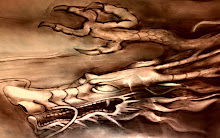After exactly eight months and six days of wall-sharing with Li Jie, our capricious landlord, she has finally broken the Dromedary’s back. The stand-out moments have been accosting her camera after we caught her taking photos through our windows, catching her red-handed with our slippers, rice-cooker, and Christmas wreath, and coercing her assistance to obtain a registry of residence, after she went into hiding for a week and then attempted to escape through the back of the police station. To the credit of Li Jie, she did successfully steal our red paper fu, cut off our Internet and run a free wire into her room, and win a nine-week battle to not give us a tax fapiao. Still in dispute is whether we will start paying the rent six weeks instead of two weeks in advance, because according to Li Jie,
contracts in China sometimes just change. Needless to say, we have begun hatching a series of escape plans. Escape plan one was to move into the living quarters of my English college, and enjoy the tranquil backwaters of the airport. The dream glowed with the
colours of summer days, barbecues by the pool, and
the tranquil sounds of birds, frogs, and (admittedly) airplanes flying overhead every 12 minutes. In a deeper way it was charged with the desire to cut my commute, and have an extra three hours a day to sleep. However, after a short tour, my dream began slipping away. Reality would have found me living in a swampy,
mosquito-infested room in a Rapunzel-ish tower, without ceiling lights. My diet would have come to depend on one restaurant, and my ‘three hours a day’ would have been spent hand-washing my clothes.
Escape plan two was to move into our friend’s empty, unfurnished apartment, and invest our rent money into jazzing it up. During this period my fantasies became domestically decadent, as
I began to conjure up a soft, feathery mattress, and a washing-machine with a spin-cycle. After wooing our friend with the delights of a home-cooked meal and half a dozen beers, he regretfully told us that unfurnished meant no walls and no shower, and that should marriage befall him, he would be obliged to refurnish anyway, at the whim of his new wife.
We are now deeply embroiled in
escape plan 22, which involves a seemingly endless wheeling and dealing tour of the suburbs with a 5i5j agent. The main reason we were trying to get around plan 22, was the exhausting memory of arriving in Beijing and being dragged for weeks through windowless, roach-infested apartments, and
candy-pink rooms with plastic chandeliers. To throw another spanner in the works, the Olympic fervour has put dollar signs in every landlord’s eyes. Agents are hiking the prices, and landlords are asking double for August. The way I see it, I’m going to rent a place for two years, not two weeks, and with their asking prices,
I couldn’t afford to go to the Olympics, even if I liked ribbon-twirling.So, we find ourselves between a rock and a hard place – another three months of Li Jie, or coughing up the dough because a few hurdlers and acrobats are coming to town.

 On Sunday afternoons one can find swarms of tourists in central Beijing with their fancy cameras, elbowing each other out of the way for one of the cities most famous shots: The Forbidden City Reflected.
On Sunday afternoons one can find swarms of tourists in central Beijing with their fancy cameras, elbowing each other out of the way for one of the cities most famous shots: The Forbidden City Reflected.




 it is us. we are dreaming together again – soaring through the sky wrapped in the promises of a hanging full moon. the night has us gently in her palm, but soon she will tire – and leave us to tumble through the darkness …
it is us. we are dreaming together again – soaring through the sky wrapped in the promises of a hanging full moon. the night has us gently in her palm, but soon she will tire – and leave us to tumble through the darkness … 
 in blinding heat we see flashes of jasmine and marigolds, ripened fruits fermenting on the roadside, and the sandy earth stirring, awaiting the violence of the monsoon. as i turn my head, india turns herself upside-down – the winds of saris sweeping the streets with golden dust.
in blinding heat we see flashes of jasmine and marigolds, ripened fruits fermenting on the roadside, and the sandy earth stirring, awaiting the violence of the monsoon. as i turn my head, india turns herself upside-down – the winds of saris sweeping the streets with golden dust.  my hands touch her first, wrists bound in jingling bangles, and palms stained with ash-orange henna. i cover my hair, lower my eyes, and disappear. in sarojini nagar he opens his eyes and looks up. i am no longer me, but her, and he is no longer him, but them.
my hands touch her first, wrists bound in jingling bangles, and palms stained with ash-orange henna. i cover my hair, lower my eyes, and disappear. in sarojini nagar he opens his eyes and looks up. i am no longer me, but her, and he is no longer him, but them.


























































